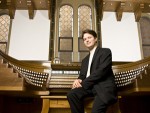Column Name
Title
Born and raised in Washington, Pa., Paul Jacobs attended the Curtis Institute of Music, where he received a bachelor’s degree, and the Yale School of Music and Yale Institute of Sacred Music, where he received a master’s degree. He joined the Juilliard faculty in 2003 at the age of 26—making him one of the youngest faculty members in the School’s history—and has been chair of the Organ Department since 2004.
Body
When did you first know you wanted to be a musician and how did you come to know it?
Growing up in a mostly rural area into a non-musical family, I suppose it was unexpected to have been powerfully drawn to music at an early age. My grandparents had a few old records of Liberace. To my 5-year-old ears, his six-minute version of Tchaikovsky’s famous piano concerto enchanted me (which is just a tad embarrassing to admit!). But inch by inch, the mystery and beauty of so-called classical music—music that my own peers flippantly dismissed—took grasp of my life.
Who was the teacher or mentor who most inspired you when you were growing up and what did you learn from that person?
There were and continue to be many honest, hard working, good people in my hometown. Finding kindred spirits with regard to music, however, was sometimes a challenge. Nonetheless, there were several individuals who deepened my love of music and provided unwavering support throughout my childhood and teenage years. They were my piano teacher, Susan Woodard, my organ teacher, George Rau, and the parish priest at church, Fr. John Bauer. All three profoundly influenced my attitude towards art and life, and I continue to feel indebted to them. Music wasn’t something merely fun, exciting, or even moving, but an actual reflection of Divine Love—sparks fallen down from heaven itself.
What was the first recording that you remember hearing or buying? What was its significance to you?
It might be more interesting to explain how I initially listened to music. I drew sea creatures playing instruments on pieces of paper, laid them out systematically on the floor, turned up the stereo, and imagined I was conducting a large orchestra. Listening to piano and organ recordings, I frequently envisioned myself as the performer. My guess is that many young musicians possess a similar kind of imagination.
What are your non-music related interests or hobbies? What would people be surprised to know about you?
Taking a few art history courses as an undergraduate, I became quite enamored with the intricacies and history of painting (though I myself can barely draw stick figures).
Recently, though, a former student was shocked to discover I’ve never in my life attended any professional sport games. Baseball is the one where the objective is for the player to hit house-runs and avoid being tackled, right? See, at least I know the basics.
If your students could only remember one thing from your teaching, what would you want it to be?
It is of paramount importance to me that my students develop an insatiable desire to deepen the mystery of their art in their everyday lives. When one is convinced of the power and relevance of this, one is struck by an overwhelming urgency to bring this to a culture so desperately in need of beauty.
What is your favorite thing about New York City?
This is impossible to say, given the vast scope of offerings and experiences here in the Big Apple. In general, “experiencing” that N.Y.C. is the nerve center for the arts in the United States is more than a little gratifying. Another point (which might seem obtuse) is that I’m quite fond of the change of seasons, and especially overcast days. Imagine living in Miami or San Diego. There’s simply too much sunshine. Brahms could never have composed his G-Minor Piano Quartet living in such cities!
Do you have any favorite writers?
The great English writer G.K. Chesterton gives me much joy. A man of towering genius, he wrote everything from vigorously philosophical works to poetry and detective fiction. So often modern thinkers (and sometimes artists) are dreary; they seem to possess an ultimate sense of gloom about life. Chesterton searches for and finds a foundation for genuine joy and profound happiness. This is no mere shallow optimism.
If you weren’t in the career you are in, what would you be doing?
As a student at Curtis, this very practical question was posed to the class. I recall most students were, with little difficulty, successfully able to identify at least one other plausible career option. Earnestly I did my best to do the same—but failed. To this day I sincerely cannot imagine what on earth I could possibly do other than music. True, many subjects interest me, and the world is endlessly fascinating, but what can compare with a lifestyle enslaved to the great geniuses of music? Besides, I’m not really good at anything else.





